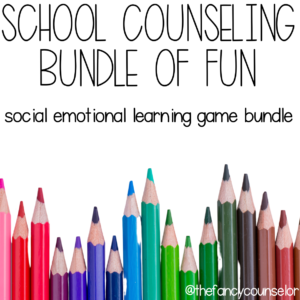As a school counselor, your role goes beyond counseling. You’re probably in the classroom teaching counseling lessons regularly. Children, especially those who are facing difficult situations need a safe and engaging space to sort out tough topics like emotions. To make counseling lessons exciting and engaging for children, incorporating games into your sessions can work wonders. After all, the children are sitting in full on lessons all. day. LONG! Play is critical for a child’s overall development,So let’s discuss how you can incorporate play into counseling lessons for a fun and engaging experience.
1. Board games are not just fun, they are excellent tools for teaching teamwork and problem solving skills. Games like Jenga, Snakes, and Ladders, and Guess Who can be used to address counseling topics like empathy, problem-solving, and communication. These games allow children to express themselves in a safe and non-judgmental environment. Use board games to create engaging discussions, encourage active listening, and promote positive behaviors in children.
2. I know sometimes the children can get a little silly and giggly, but role-playing is so valuable! It can be an effective tool for teaching social and interpersonal skills. It allows children to explore different scenarios, practice communication skills, and develop empathy. Whether it’s a simple role-play of a conflict between friends or a more complex scenario, like acting out how to handle bullying, role-playing can help children develop problem-solving skills and feel empowered.
3. Storytelling can be a powerful way to teach children about emotions, problem-solving, and positive behaviors. All kids love stories, and they can be a great way to hook children’s attention into lessons. Use picture books to start discussions about topics like empathy, feelings, and acceptance. Or, use student created stories to create a safe space where children can share their experiences. A fun game I used when I was a classroom teacher was this one:
- Have each child start a story about a counseling topic.
- Set a timer for 3 minutes.
- Once the timer goes off, children must exchange papers, and a peer will write the next paragraph.
- (Since this blog post is counseling specific, this is an easy transfer into school counseling lessons. Keep your topics counseling related and let the kiddos have a blast with this activity!)
- Encourage children to create and share their stories to develop their own voice and build confidence.
I am a huge fan of Julia Cook story books because they are so specific to elementary counseling topics. Julia Cook is a school counselor’s dream! Her stories really speak to real life situations that children experience. But story time alone may not be enough to fill a school counseling lesson or keep every child engaged. Use these extension activities to stretch your lessons in a meaningful way, and help the children assess and master the skill topics from Julia Cook stories.
If you’re already a school counseling “gamer”, I don’t want you to feel like you have to constantly search for fresh ideas. Get yourself a tried and true game that the kids jump for joy for when they see it, and just go with it. You can even use these games as a lesson starter, or reward for a great lesson. Because I needed this when I was at the elementary level, I created this year long bundle of school counseling games and activities. This is a great resource for educators to file away for substitute teachers, when you’re stumped for a lesson topic, or any other time when you are teaching self awareness topics.
Whether you use board games, role-playing, or storytelling, there are many ways to incorporate fun games into school counseling. By creating a fun and engaging environment, you will help children develop the skills they need to develop self awareness. Remember, “play is often talked about as if it were a relief from serious learning. But for children, play is serious learning. Play is really the work of childhood,” as once said by Fred Rogers.

